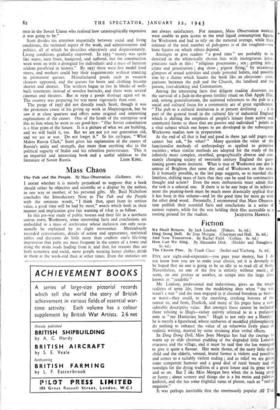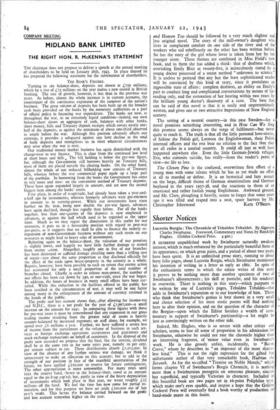Fiction
We Shall Return. By Jack Lindsay. (Dakers. 8s. 6d.) Ding Dong Dell. By Joan Morgan. (Chapman and Hall. 8s. 6d.) And Now Tomorrow. By Rachel Field. (Collins. 8s. 6d.)
How Can We Sing. By Alexandra Dick: (Hodder and Stoughton 8s. 6d.)
The Cloven Pine. By Frank Clare. (Seeker and Warburg. 8s. 6d.) FIVE new eight-and-sixpennies---you pays your money, but I do not know how you are to make your choice, yet it is devoutly to be hoped that no one' is going to be so idle as to read all of them. Nevertheless, no one of the five is entirely without merit ; all seem, on one pretext or another, to scrape into the large class known as " readable " Mr. Lindsay, professional and industrious, gives us the tough realities of army life, from the maddening days when " the war wasn't a war " and the men engaged in it cheated boredom as best— or worst—they could, to the smashing, crashing horrors of the retreat to, and from, Dunkirk, and many of his pages have a con- siderable descriptive value. But amongst these cannot be included those relating to Hugh—rather naively referred to in a prefator note as " my Hamletian _hero." Hugh is not only not a Hamlet: he is merely a figurehead, whose outbursts of muddled philosophising do nothing to enhance the value of an otherwise lively piece or realistic writing, marred by some straining after verbal effects. In Ding Dong Dell, Miss Joan Morgan has had the courage to warm up ye olde chestnut pudding of the degraded little London evacuees and the village, and it must be said that she has managed to give it quite a flavour. Her main theme, of the nasty little slum child and the elderly, sensual, brutal farmer is violent and possible. and comes to a suitably violent ending ; and as relief we are given some competent humour and a good deal of rural beauty and of nostalgia for the dying tradition of a great house and its great trees and so on. But I like Miss Morgan best when she is being crisp or funny ; about scenery and things she is a bit moist and palette- knifeish, and she has some frightful turns of phrase, such as "rather exquisite." It was perhaps inevitable that the enormously popular AU This and Heaven Too should be followed by a very much slighter and less original novel. The story of the mill-owner's daughter who lives in complacent comfort On one side of the river and of the workers who toil rebelliously on the other has been written before. So has the story of the girl whose lover is taken from her by her younger sister. These themes are combined in Miss Field's new book, and to them she has added a third: that of deafness which, overtaking Emily Blair at twenty-five, is miraculously cured by a young doctor possessed of a secret method " unknown to science." It is useless to pretend that any but the least sophisticated reader will be convinced by this kind of story, since it postulates an inipossible state of affairs: complete deafness, an ability on Emily's part to conduct long and complicated conversations by means of lip- reading only, and the restoration of her hearing within two years by the brilliant young doctor's discovery of a cure. The best that can be said of this novel is that it is easily and unpretentiously written, and gives one or two attractive impressions of New England scenery.
The setting of a neutral country—in this case Sweden—for a novel promises something interesting, and in How Can We Sing this promise seems always on the verge of fulfilment—but never quite to reach it. The truth is that all the little personal love-stories, of Sabine the Polish girl, Leonora the Englishwoman, their Polish interned officers and the rest bear no relation to the fact that they are all exiles in a neutral country. It could all just as well have happened anywhere else. Even the little German-Jewish refugee. Eva, who commits suicide, has really—from the reader's point of view—no life to lose.
The Cloven Pine is the confused, overwritten first effort of a young man with some talents which he has as yet made no effort at all to marshal or define. It is an hysterical and lazy assault on the large, difficult theme of German emotionalism and German boyhood in the years 1937-38, and the reactions to them of an emotional and rather foolish young Englishman. Awkward ground. and Mr. Clare, ploughing it heavily, seems to forget that some years ago it was tilled and reaped into a neat, spare harvest by Mr.



























 Previous page
Previous page